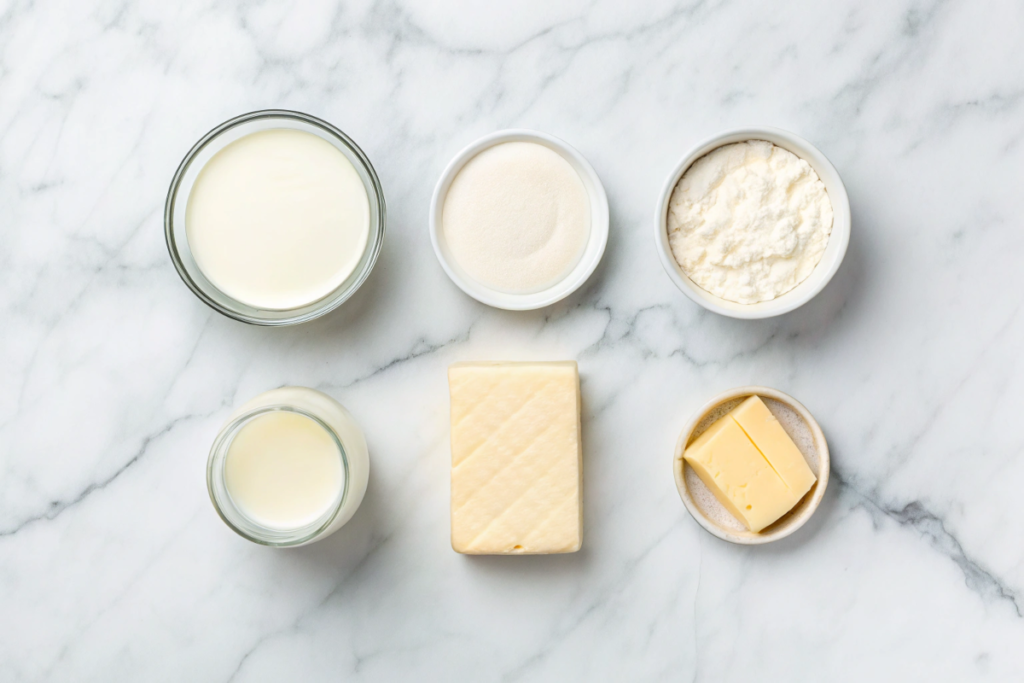Brie cheese is celebrated worldwide for its creamy texture, rich flavor, and elegant appearance. However, one characteristic that often puzzles cheese enthusiasts is its distinct ammonia-like smell. If you’ve ever encountered ammonia smell in Brie, you might wonder, why does Brie smell like ammonia?
This comprehensive guide delves into the reasons behind this aroma, exploring the science, safety, and ways to manage and enjoy Brie without being overwhelmed by its scent. If you want more Brie ideas, check out these air fryer Brie recipes.
What Is Brie Cheese?
History, Flavor Profile, and Texture
Brie cheese, often referred to as the “Queen of Cheeses,” originates from the Île-de-France region of France. This soft cheese is made from cow’s milk and is known for its pale interior with a slightly off-white, edible rind.
The flavor of Brie is mild yet complex, offering buttery and earthy notes that deepen with aging. Its smooth, creamy texture makes it a favorite for both casual snacking and gourmet dishes. Understanding the composition and production process of Brie helps explain why it sometimes develops a unique aroma, including the ammonia scent.
Why Does Brie Develop a Smell?
The Science Behind the Aromas in Brie Cheese
Cheese aroma is influenced by various biochemical processes that occur during fermentation and aging. In Brie, specific bacteria and enzymes break down proteins and fats, releasing volatile compounds responsible for its distinct smell.
The Brie cheese ammonia odor primarily results from the decomposition of amino acids into ammonia gas. This process is a natural part of cheese maturation, contributing to the complex flavor profile that Brie is known for.
What Causes the Ammonia Smell in Brie?
The Role of Bacteria and the Breakdown of Proteins
The ammonia aroma in Brie is primarily caused by the action of certain bacteria, such as Brevibacterium linens, which are intentionally introduced during the cheese-making process. These bacteria thrive in the rind, where they break down proteins into amino acids and further into ammonia.
This chemical reaction produces the characteristic ammonia smell that some people associate with Brie. Additionally, the extent of this smell can vary based on factors like the cheese’s age, storage conditions, and specific bacterial cultures used.
Is the Ammonia Smell in Brie Safe?
Understanding When Brie Is Safe to Eat
One common concern is whether the ammonia smell indicates spoilage or makes the cheese unsafe to consume. In most cases, Brie cheese odor explained by the presence of ammonia is a normal part of the cheese’s aging process and does not mean the cheese has gone bad.
However, excessive ammonia smell accompanied by other signs of spoilage, such as mold growth beyond the edible rind or an overly sour taste, may indicate that the Brie is no longer safe to eat. Always rely on your senses and when in doubt, err on the side of caution.

How to Tell If Brie Has Gone Bad
Signs to Differentiate Between Natural Aromas and Spoilage
Distinguishing between the natural ammonia smell and spoilage in Brie can be tricky. Here are some indicators to help you determine if your Brie is still good to eat:
- Visual Inspection: Look for any unusual mold growth beyond the standard white rind. Colors like green or black mold are signs of spoilage.
- Texture: Fresh Brie should be creamy and soft. If the cheese feels excessively dry or crumbly, it might be past its prime.
- Taste: A spoiled Brie will have a sour or bitter taste, unlike the mild, creamy flavor of fresh Brie.
- Smell: While a mild ammonia smell is normal, an overpowering or pungent odor might indicate that the cheese is no longer fresh.
By paying attention to these signs, you can enjoy Brie cheese safely and avoid consuming spoiled products.
Does All Brie Smell Like Ammonia?
Factors That Influence the Intensity of the Smell
Not all Brie cheeses emit a strong ammonia smell. The intensity of the aroma can vary based on several factors:
- Age of the Cheese: Younger Brie tends to have a milder smell, while aged Brie may develop a more pronounced ammonia scent.
- Storage Conditions: Proper storage in a cool, humid environment can help control the development of ammonia. Improper storage may accelerate the process, leading to a stronger odor.
- Bacterial Cultures: Different cheese-makers use varying strains of bacteria, which can influence the extent of ammonia production.
- Quality of Milk: High-quality milk with minimal contamination can result in a more pleasant aroma in the finished cheese.
Understanding these factors can help you select a Brie that suits your preference for aroma intensity.
How Aging Affects Brie’s Aroma
The Relationship Between Maturation and Ammonia Scent
Aging plays a crucial role in the development of Brie’s aroma. As the cheese matures, the activity of bacteria increases, breaking down more proteins and releasing additional ammonia. This process enhances the complexity of the cheese’s flavor but also intensifies the ammonia smell. Proper aging allows Brie to reach its optimal flavor profile, where the ammonia aroma is balanced with the cheese’s creamy and buttery notes.
How to Reduce the Ammonia Smell in Brie
Simple Methods to Make Brie More Palatable
If the ammonia smell in your Brie is too strong for your liking, there are several ways to mitigate it:
- Air Out the Cheese: Allow the Brie to sit at room temperature for about 30 minutes before serving. This can help dissipate some of the ammonia odor.
- Proper Storage: Store Brie in a cheese box or wrapped in wax paper, then placed in a partially open plastic bag to maintain humidity while allowing some airflow.
- Pairing with Strong Flavors: Serving Brie with sweet accompaniments like honey, fruits, or nuts can help balance and mask the ammonia aroma.
- Cutting and Exposing More Surface Area: Slice the Brie to expose more of its interior, which can help reduce the concentration of the ammonia smell.
These methods can make Brie more enjoyable, especially for those sensitive to strong odors.

Best Ways to Store Brie to Prevent Ammonia Smell
Proper Storage Tips to Maintain Freshness
Proper storage is essential to control the development of ammonia in Brie. Here are some tips to keep your Brie fresh and minimize unwanted smells:
- Refrigeration: Store Brie in the refrigerator at a temperature between 35°F and 45°F (1.7°C to 7.2°C). Avoid storing it in the coldest part of the fridge to prevent freezing.
- Wrapping: Use cheese paper, wax paper, or parchment paper to wrap Brie. These materials allow the cheese to breathe while maintaining moisture levels.
- Avoid Airtight Containers: While it might seem counterintuitive, airtight containers can trap moisture and accelerate the production of ammonia. Instead, use a container that allows for some airflow.
- Separate Storage: Keep Brie away from strong-smelling foods in the refrigerator to prevent odor absorption.
Following these storage practices can help maintain the quality and aroma of your Brie cheese.
Pairing Brie with Food to Balance the Aroma
Complementary Pairings Like Fruits, Crackers, and Wine
Pairing Brie with the right foods can enhance its flavor and balance the ammonia smell. Consider these complementary pairings:
- Fruits: Fresh or dried fruits like apples, pears, figs, and grapes add natural sweetness that contrasts with the savory notes of Brie.
- Nuts: Almonds, walnuts, and pecans provide a crunchy texture and earthy flavor that complements the creamy cheese.
- Crackers and Bread: Whole grain crackers, baguette slices, and crostini offer a neutral base that allows the Brie’s flavors to shine.
- Honey and Jams: Sweeteners like honey, fig jam, or apricot preserves can mask the ammonia aroma and enhance the cheese’s natural sweetness.
- Wine: Pair Brie with white wines like Chardonnay or Sauvignon Blanc, or try a light red like Pinot Noir to elevate the overall tasting experience.
These pairings not only improve the taste but also make the Brie more enjoyable by balancing its aromatic profile.
Popular Myths About Brie and Ammonia Smell
Debunking Misconceptions About Brie’s Aroma
Several myths surround the ammonia smell in Brie cheese. Let’s debunk some common misconceptions:
- Myth 1: Ammonia Smell Means the Cheese Is Spoiled: As discussed, a mild ammonia odor is a natural part of Brie’s aging process and doesn’t necessarily indicate spoilage.
- Myth 2: All Brie Smells Like Ammonia: The intensity of the ammonia smell varies. Not all Brie cheeses emit a strong ammonia scent, especially younger varieties.
- Myth 3: You Can’t Enjoy Brie If It Smells Like Ammonia: With proper pairing and preparation, the ammonia aroma can be managed, allowing you to enjoy the full flavor of Brie.
- Myth 4: Only Poor-Quality Brie Has an Ammonia Smell: High-quality Brie can also develop an ammonia aroma as part of its natural maturation, so it’s not an indicator of poor quality.
Understanding the truth behind these myths can help you appreciate Brie cheese without unnecessary concerns about its aroma.
Choosing High-Quality Brie with Minimal Ammonia Smell
Tips for Selecting Fresh, Well-Made Brie
Selecting high-quality Brie can significantly impact your experience with its aroma. Here are some tips for choosing the best Brie:
- Check the Expiration Date: Fresher Brie is less likely to have a strong ammonia smell. Choose cheeses that are within their recommended shelf life.
- Inspect the Rind: Look for a smooth, white rind without excessive cracks or mold growth. A well-maintained rind indicates good quality.
- Smell Before Buying: Give the cheese a gentle sniff. A subtle, pleasant aroma is ideal, whereas an overpowering ammonia smell might indicate an older or improperly stored cheese.
- **Purchase from Reputable
Cheese Shops:** Buy Brie from trusted vendors who prioritize quality and proper storage. Specialty cheese shops often have knowledgeable staff who can recommend the best options.
- Look for Organic or Artisanal Brie: These varieties are often made with higher-quality ingredients and better production standards, which can result in a more balanced aroma.
By following these tips, you can select Brie cheese that offers a delightful flavor and a manageable aroma, enhancing your overall cheese experience.
Health Benefits of Eating Brie
Nutritional Advantages of Including Brie in Your Diet
Brie cheese is not only delicious but also offers several health benefits when consumed in moderation:
- Rich in Nutrients: Brie provides essential nutrients such as calcium, protein, and vitamins A and B12, which are crucial for bone health, muscle maintenance, and overall well-being.
- Healthy Fats: The monounsaturated fats in Brie support heart health by helping to reduce bad cholesterol levels.
- Probiotics: Brie contains beneficial bacteria that can aid in digestion and promote a healthy gut microbiome.
- Antioxidants: Vitamins and minerals in Brie act as antioxidants, helping to protect the body from free radical damage.
- Energy Boost: The combination of fats and proteins in Brie provides a sustained source of energy, making it a satisfying snack option.
Incorporating Brie into your diet can contribute to a balanced and nutritious eating plan, offering both flavor and health benefits.
FAQs About Brie Cheese Ammonia Odor
Why does Brie smell strong?
Brie develops a strong smell due to the activity of bacteria that break down proteins into amino acids and ammonia during the cheese’s maturation process.
Is Brie with an ammonia smell safe to eat?
Yes, a mild ammonia smell is a natural part of Brie’s aging. However, if the smell is overpowering and accompanied by other signs of spoilage, it may not be safe to consume.
How can I reduce the ammonia smell in Brie?
Letting the Brie sit at room temperature before serving, pairing it with sweet or acidic foods, and proper storage can help reduce the ammonia aroma.
Does all Brie cheese develop an ammonia smell?
No, not all Brie cheeses will have a strong ammonia smell. The intensity depends on factors like age, storage conditions, and bacterial cultures used during production.
Can I freeze Brie to prevent it from smelling like ammonia?
Freezing Brie can alter its texture and flavor. It’s better to store it properly in the refrigerator and consume it within its shelf life to minimize ammonia development.
Conclusion
Why does Brie smell like ammonia? The ammonia aroma in Brie cheese is a natural part of its maturation process, resulting from the breakdown of proteins by specific bacteria. While it can be off-putting for some, understanding the science behind the smell and knowing how to manage it can enhance your appreciation of this beloved cheese.
By selecting high-quality Brie, storing it correctly, and pairing it with complementary flavors, you can enjoy the rich, creamy texture and delightful taste of Brie without being overwhelmed by its aroma.
Embrace the complexity of Brie cheese and explore various ways to incorporate it into your meals. Whether you’re serving it as an elegant appetizer, pairing it with fruits and nuts, or enjoying it with a glass of wine, Brie offers a versatile and delicious addition to any dining experience.
With these insights, you can confidently navigate the nuances of Brie cheese and savor its unique qualities to the fullest.
Happy cheese tasting!

